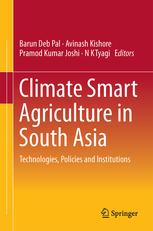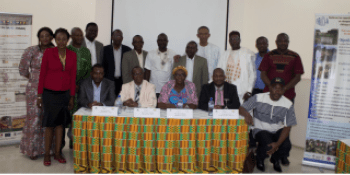Promoting climate-smart technologies through policies and institutions in South Asia

A collection of evidence-based research studies seek to understand and decode the technology-institution-policy nexus to reduce the impact of climate change.
Adapting to and mitigating climate change impacts on agriculture poses a significant challenge for the sector, which needs to produce more food for an ever-increasing population, but with a declining and increasingly degraded natural resource base. It is well established that in agriculture, fertilizers, flooded rice cultivation, energy use in irrigation, tillage and enteric emissions from ruminant animals are the main contributors of greenhouse gasses to the atmosphere, comprising about one-fourth of total emissions.
The evolution of climate-smart agriculture (CSA) is one of the responses of the science community to this multiheaded hydra. In principle, CSA may help achieve higher production with reduced emissions. This would have been the simple answer to climate change impacts on agriculturite, if the issues were simple. But they rarely are. For instance, smallholder farmers of South Asia, who are already facing a plethora of non-climatic stresses, have limited capacity to adopt new technologies.
There is a host of barriers—which take the form of limited access to natural resources, information, finance, and above all, human capital—that get in the way of technology adoption. Overcoming these barriers requires institutions and policy support.
Recently, scientists from economics and allied agricultural disciplines working on understanding the interconnections between climate change and agriculture were brought together to work on some of the burning climate change-induced issues faced by farmers of South Asia. The idea was to come up with evidenced-based policy findings which could be shared with policymakers, with the belief that implementation of these policy interventions will lead to a positive shift towards an environmentally safe and profitable agriculture.
As an outcome of this work, the scientists produced a book titled Climate-Smart Agriculture in Asia: Technologies, Policies and Institutions. The book is largely based on research conducted with financial support from the CGIAR Research Program on Climate Change, Agriculture and Food Security (CCAFS). It begins with a discussion on the duality of the relationship between climate change and agriculture: the impact of climate change on agriculture and the status of greenhouse gas emissions due to agriculture are briefly reviewed to provide an overview of the nature and magnitude of the problem.
Subsequent discussion analyzes the research and capacity gaps in policies, institutions, and markets in the Indo-Gangetic Plain (IGP) of South Asia, including the states of Bihar, Punjab and Haryana in India, and Nepal and Bangladesh. Independently, the book also studies the peninsular region of India.
Further discussions include:
- Understanding the dynamic nature of small farm holdings, and smallholder farmers' preferences and capacity to change from subsistence to commercial farming;
- Identification, analysis, and prioritization of several climate-smart technologies for different agro-ecological regions, which impart resistance and resilience to farming enterprises by improving the use efficiency of water, fertilizer, pesticides, and energy;
- At the macro-level, a biophysical and socio-economic model has been configured to evaluate climate-smart technologies and develop investment priorities across regions, commodities, and technologies under different climate change scenarios.
In later chapters, a trajectory of policies is outlined to mobilize institutions and resources for faster development of small farm holders with respect to (i) developing a database for the impacts of climate change at a household level; (ii) building human capital; (iii) exploring linkages between climate change, agriculture and nutrition; and (iv) up-scaling the concept of bio-industrial watersheds to reduce dependency in agriculture. The features of weather index-based crop insurance, including Index Based Flood Insurance (IBFI) in India and a few developing countries, have been reviewed to identify specific requirements for their upscaling.
The book concludes with an examination of the efficacy of institutional and technological measures in reducing farmers’ vulnerability and increasing their adaptation to climatic extremes. This is investigated by describing some case studies from the Indo-Gangetic plain. Special attention has been directed to the Indian agriculture sector, and a first-order quantitative assessment of the impacts of government policies has been carried out with the help of specific performance indicators for mitigation, adaptation, resilience, and sustainability of agriculture.
Read more:
- Book: Climate Smart Agriculture in South Asia. Technologies, Policies and Institutions
- Project page: Scaling-up climate-smart agriculture through policies and institutions in South Asia
The editors would like to acknowledge the help of people and institutions without whose support this book would not have become a reality. First, we thank the authors for their contributions. The book is largely based on research conducted with financial support from CCAFS. We are deeply grateful to the CGIAR Fund Council, Australia (ACIAR), Irish Aid, European Union, International Fund for Agricultural Development (IFAD), Netherlands, New Zealand, Switzerland, UK, USAID and Thailand for funding to CCAFS. The administrative support extended by the staff of IFPRI South Asia office is gratefully acknowledged. We also express our gratitude to Springer, the publisher of this book and their editorial staff, who assisted in the editing and design.
The editors of the book include the following people:
Dr. Barun Deb Pal is a Program Manager at IFPRI South Asia, New Delhi, India. Dr. Avinash Kishore is working as a Research Fellow at IFPRI South Asia, New Delhi, India. Dr Pramod Kumar Joshi is the Director of IFPRI South Asia, New Delhi, India. Dr N K Tyagi is a Former Member of the Agricultural Scientists' Recruitment Board, India.




